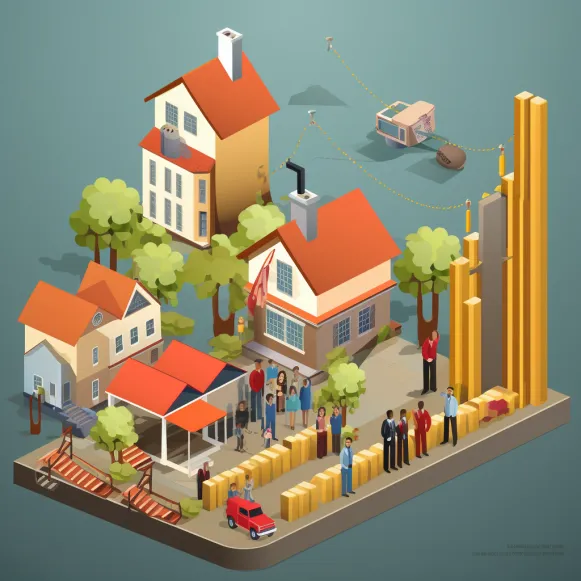Should I buy a house now or wait? Experts weigh in on the current market

Prospective homebuyers across the United States are feeling the pinch as home prices rise and mortgage rates rise. In the face of these challenging conditions, many homeowners are hesitant to sell, further limiting the already limited supply of homes on the market.
“The unintended consequence of the so-called lock-in effect has limited the supply of homes for sale, because most owners have relatively low mortgage rates and don’t want to move,” says Mark Hamrick, senior economic analyst at Bankrate.
As a result, today’s housing market differs from previous years. “Buyers and sellers both typically take a step back in the fall, but mortgage rates now near 8% are cooling the market faster than normal,” says Jeff Tucker, senior economist at Zillow. “A lack of competition from other buyers is offering opportunities to those still in the market, as many listings are lingering after the summer shopping season.” Continue reading to learn more about the current state of the US housing market.
Key drivers of the US housing market
—Home prices are skyrocketing. According to the National Association of Realtors (NAR), the country’s median existing-home price surpassed $400,000 three times this year — in June, July, and August — bringing it within a few thousand dollars of its all-time high ($413,800, in June 2022). The third consecutive month of year-over-year median home price increases occurred in September.
—Housing inventory is insufficient to meet demand, resulting in a nationwide housing shortage that has been difficult to alleviate. According to NAR data, there was only a 3.4-month supply of homes for sale in September, far short of the 5 or 6 months required for a healthy, more balanced market.
—The rate of new construction has yet to alleviate the shortage significantly. According to data from the U.S. Census Bureau and the Department of Housing and Urban Development, both new building permits and housing starts, which measure the start of construction on a new residential home, fell more than 7% year on year in September.
—Mortgage interest rates rose further, reaching 8% in mid-October for the first time in 23 years. Rates were lower than 3.5% just two years ago, in October 2021. This obstacle alone puts home ownership out of reach for many Americans for the time being.
Local markets have their own dynamics
Local market conditions can vary greatly by region, state, or even city. Because of the disparities, your money can go much further in some markets than in others.
The distinct Florida housing market is a prime example. According to a NAR study, the Sunshine State led the country in net migration last year — meaning it outnumbered all other states in terms of new residents moving there — despite being in the grip of a home-insurance crisis that has rendered some properties uninsurable. Perhaps this is why, despite high buyer demand, its home prices remain roughly in line with the national median.
According to Redfin data, median home prices in notoriously expensive San Francisco remain well above $1 million ($1.33 million as of September 2023). This despite a 5.4% year-over-year drop and the state of California losing residents rather than gaining them last year.
Meanwhile, in Austin, Texas, prices have been on a roller coaster, influenced by a surge in tech companies and remote workers. According to Redfin, the median home price began 2021 at $465,000, then skyrocketed to a high of $670,000 by mid-2022 before dropping back to $525,000 and then jumping back above $600,000 in 2023. Despite these fluctuations, a recent Bankrate study named Austin the best place in the country to start your career.
Getting a Glimpse of the Current Housing Market
Are you planning to buy or sell a home soon? Your experience will vary depending on a number of factors, including mortgage rates and home prices, which are both at historically high levels.
While experts predict that the market will eventually cool down, they are confident that a housing market crash akin to the Great Recession of the early 2000s will not occur. Inventory is still too low, and demand is too high, for a crash to occur; additionally, mortgage lending standards are much stricter today than they were back then.
Overall, sellers continue to have the upper hand — but, as illustrated above, this can vary greatly by geographic location. “Depending on the market, location and price point, sellers could find either multiple offers or the need to be flexible on price,” Hamrick said.
Buyers who are willing to brave the market should keep their guard up. “Buyers should be aware that attractive listings still sell quickly,” Tucker said.
Should I buy a house right away or wait?
Is it a good time to buy a house right now? Whether to buy now or wait is a big decision that is heavily influenced by your personal circumstances. Yes, mortgage rates are currently high, but days on the market are also increasing, giving you more time to make an informed decision. And there’s no guarantee that things will improve if you wait.
If you’re ready to buy, keep in mind that you don’t have to go straight for your dream home. Look at what you can afford right now. “Prospective buyers might need to dial down their aspirations for what they’re willing to buy,” Hamrick said. If you have a good credit score and enough money saved for a down payment, buying now allows you to start building equity right away — you can always refinance if interest rates fall later.
Should I sell my house right away or wait?
In most of the United States, low inventory levels give sellers an advantage. However, with mortgage rates and prices remaining high, buyers are wary, making selling more difficult.
With that in mind, determining whether it is a good time to sell your home can be difficult. Again, it is dependent on a variety of personal factors. If you’re ready to downsize or retire, or if you need to relocate, selling may be a good option. However, if you need to buy a new house, the tables will be turned and you will face the same challenges that buyers are currently facing. Before you list your home, make sure you know how much it’s worth so you know what kind of profit you can expect and whether it’s worth it.
Following Steps
If you believe you are ready to begin your home-buying journey, it is critical that you continue to save as much as possible and work on your credit. A larger down payment can save you thousands in mortgage principal and interest over time, and a higher credit score will help you secure a more competitive rate, resulting in a lower monthly payment.
Also, work with an experienced local real estate agent who can assist you in successfully navigating your local market. A knowledgeable agent can assist sellers in pricing and marketing their home competitively, and buyers in negotiating a good deal on a home that meets their needs — or as close as possible. Request recommendations from friends and family, and try to interview at least three candidates before deciding on the best agent for you.
FAQs
—Are home prices in the United States falling or rising?
They are on the rise. According to the National Association of Realtors, the median home price in the United States increased 2.8% between September 2022 and September 2023 and is now just under $400,000. The median sale prices in July, August, and September were all monthly highs.
—Will the housing market in the United States collapse?
The housing market in the United States has cooled, but experts agree that it will not crash. This is largely due to a lack of housing inventory to meet demand, which means that more people want to buy a house than there are houses on the market to buy. Other factors include stringent lending standards and low foreclosure rates.






